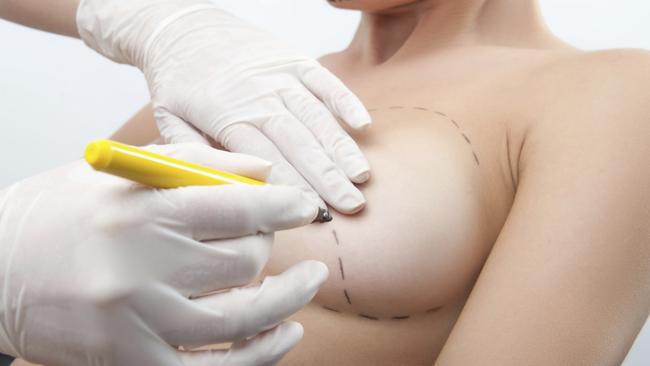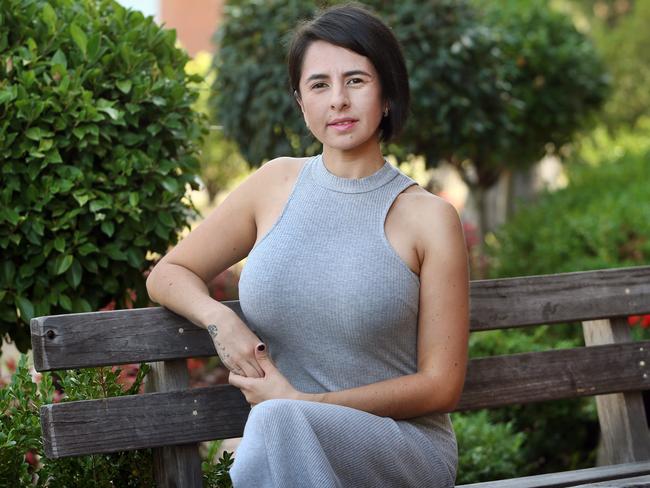Breast cancer surge linked to cut-price rough-surface implants
FIVE cancer clusters have been identified around Australia — and they’ve all been linked directly to cheap breast implants.

Illness
Don't miss out on the headlines from Illness. Followed categories will be added to My News.
FIVE cancer clusters have been identified around Australia — and they’ve all been linked directly to cheap breast implants.
Figures obtained by News Corp show 9 in 10 women who have had a breast implant in Australia have the textured devices linked to a growing number of cases of a rare blood cancer.
One doctor in Southeast Queensland having seven patients with the disease.
The device is widely used because it is heavily discounted.
Identification of the clusters was made possible by a new Australian Breast Implant Registry which has now been joined by 16 other countries.
CANCER SURGE
President of the Australian Plastic Surgeons Association Professor Mark Ashton confirmed the highest risk breast implants are being sold at half price to discount providers.
The rough surface devices are also favoured because they are less likely to shift out of position and result in revision surgery.
More than 55 Australian women who had breast implants have developed the cancer and four have died.
And the situation is only going to get worse.
The number of women having breast implant surgery has risen by more than 1000 per cent since 2005 from around 4000 to over 40,000 a year — and this does not include those who travel overseas for surgery.
It can take three to eight years for the anaplastic large cell carcinoma (ALCL) to develop and researchers are warning there could be a growing number of cases in the wake of an explosion of cheap breast enhancement surgery in Australia.
IMPLANTS STILL BEING USED
Dr Mark Magnusson, President of the Australasian Society of Aesthetic Plastic Surgeons, said historically the higher-risk implants “have had the higher share of the market”.
The cancer clusters identified by a new register of the implants are southeast Queensland, Western Australia, Victoria and Sydney.
The breast implants linked to the cancer are still on sale in Australia and they are still being used by surgeons.
Professor Anand Deva, who is researching the cancer link and has, published the most comprehensive data so far, found:

• Allergan’s Biocell implant had the highest association with the rare cancer, it was 14 times more likely to be associated with ALCL than another breast implant with a lower surface area;
• The risk of a woman with Biocell implants developing cancer in one in 3800;
• Women with a Silimed implant have a one in 7788 risk of developing the cancer
• Those who used Mentor’s Silitex implant have a one in 60,000 risk of the cancer.
“We’re being careful not to be alarmist because we don’t know all the facts and we don’t want to raise anxiety,” said Professor Rod Cooter.
Professor Cooter led the establishment of the breast implant registry that helped identify the problem.
A full-scale investigation of the extent of problem is being hampered because only two thirds of Australia’s breast surgeons are signed up and only 17,000 implants are recorded on the register.
Professor Cooter said 300 hospitals and clinics in Australia are involved in breast implant surgery and each of them has to provide ethics approval and governance approval for doctors to take part in the register.
“This is a source of some frustration, as opposed to our Dutch colleagues who have national laws of ethics approval” he said.
“A single national system would be ideal, we are trying to improve patient safety and improve outcomes for patients,” he said.
CANCER CAN BE CURED
New research has shown the cancer risk can be wiped out if surgeons practice a 14-point surgical protocol that reduces the risk of bacteria getting into the body during breast surgery.
Professor Ashton says women who catch the cancer early can be cured by removing the implant and capsule around it, more advanced cases may require chemotherapy for 12 months.
Women with breast implants should carry out regular breast checks and it they find a lump or swelling report it to their doctor or surgeon and have it investigated, he said.
The nation’s medicine watchdog the Therapeutic Goods Administration says because breast implant-associated ALCL is rare “experts do not recommend removal of breast implants for women who have no problems with the implant”.
However, Professor Magnusson says doctors are changing their practice in the wake of the research.
“In my own practice I’ve changed dramatically,” he said.
A spokeswoman dor the TGA said the regulator was reviewing the safety, quality and performance of various types of breast implants in the Australian market.
“This activity is in recognition that, although rare, lymphoma is a type of cancer that could have devastating consequences for women,” the spokeswoman said.
“ The review would also provide better evidence to inform the choice women make in choosing whether to have a breast implant solely for cosmetic purposes or after surviving cancer and needing reconstructive surgery.”
Originally published as Breast cancer surge linked to cut-price rough-surface implants



